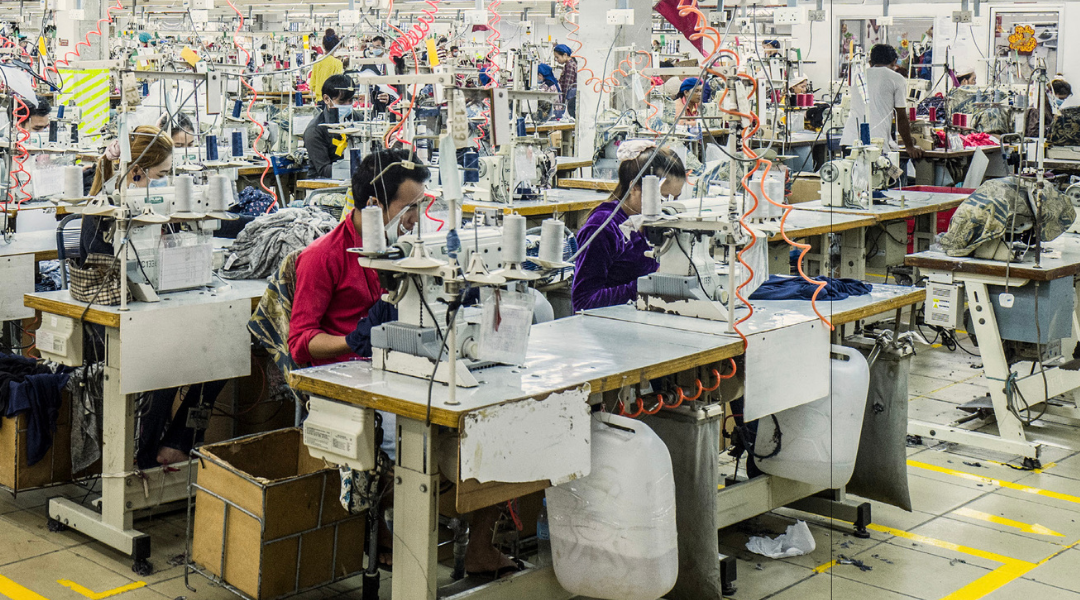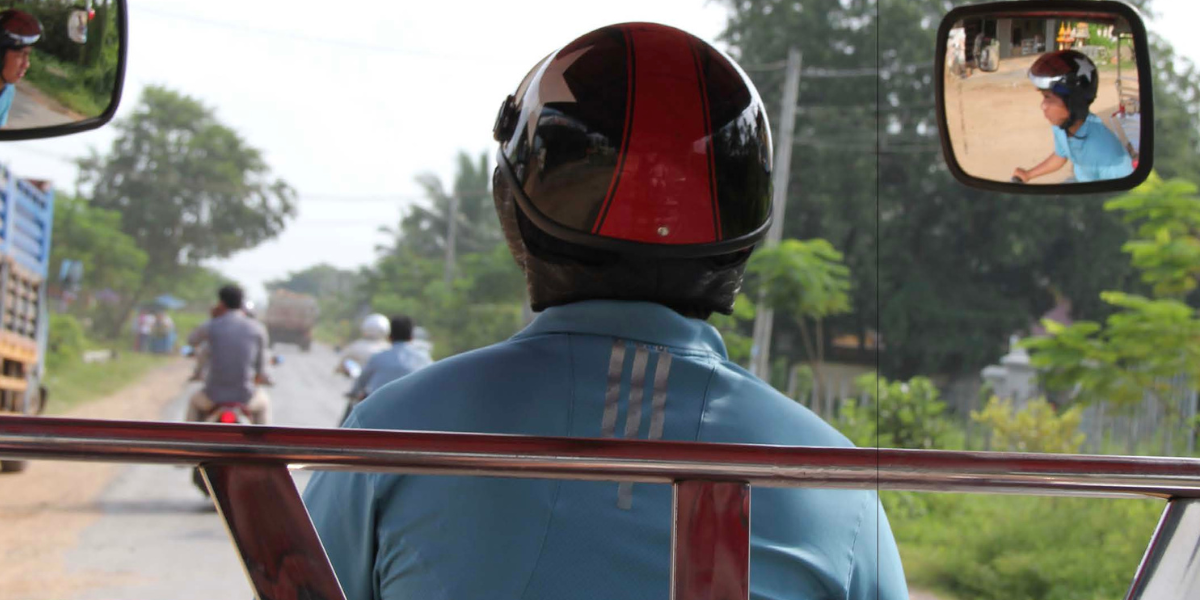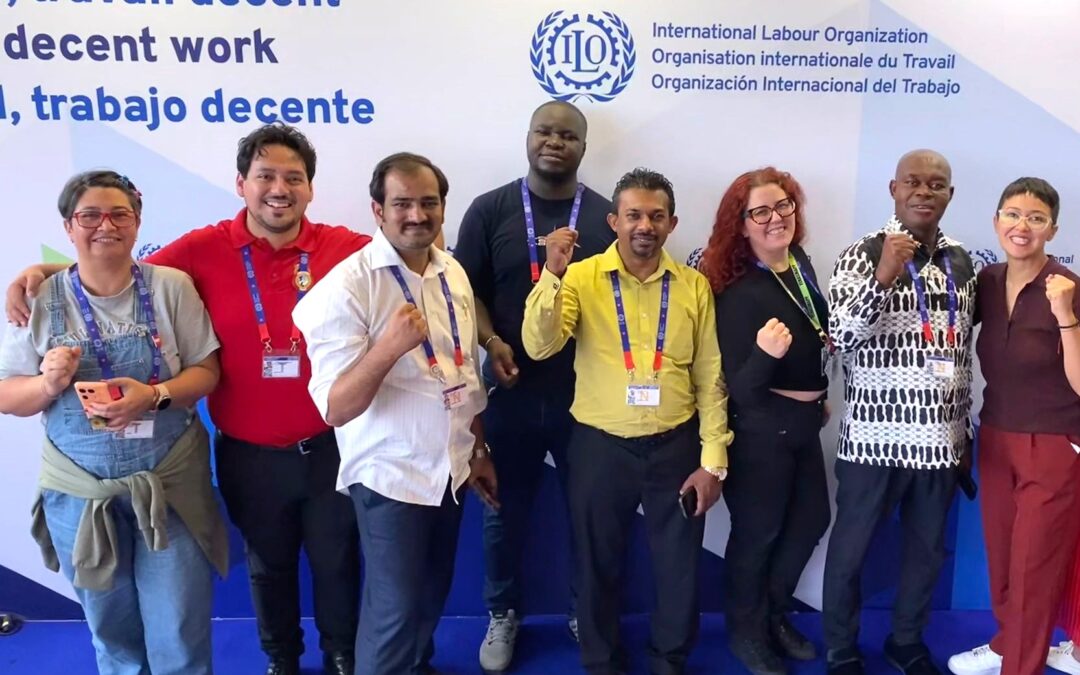
Democracy Happens when Workers Have a Voice
At the 2025 International Labor Conference (ILC), which took place June 2-14, the Solidarity Center and its partners showcased what happens when workers join together: they speak up and fight for better jobs—and a better world.
The ILC, the annual meeting of the International Labor Organization (ILO), brings together worker, employer and government representatives to debate policy, make decisions and negotiate new international labor standards to promote decent work.
As a result of our unique partnerships with working people and unions from around the world, workers assumed an active role throughout the ILC conference, building on our guiding principle that if working people have the freedom to organize and bargain, they will build more just, inclusive and democratic societies.
With Solidarity Center, Platform Workers Shape a Global Treaty
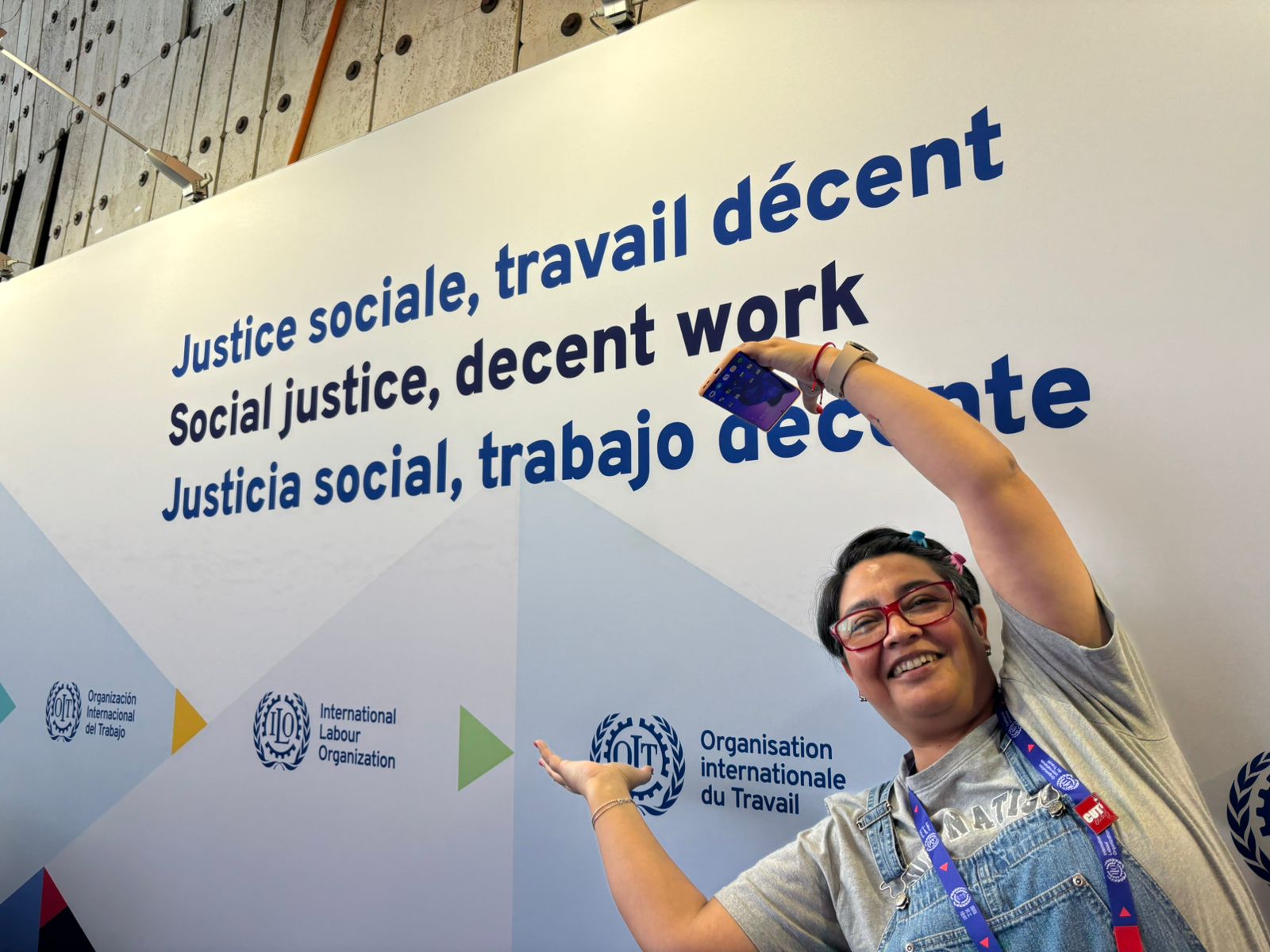
In Chile, Solidarity Center delegate Angelica Salgado Delgadillo heads the Cornershop Union of Uber and serves as a national councilor in the Central Unitaria de Trabajadoras y Trabajadores (CUT). Credit: Solidarity Center
Between 154 million and 435 million workers have online jobs around the world. While platform work is associated with ride hailing and delivery, a broad range of digital platform work is now happening through apps and websites.
A new ILAW Network publication, Taken for a Ride 3 – Lost in a Crowd: How Crowdworkers Are Denied Their Rights at Work, looks at how content moderators, software programmers and other digital platform workers engage in data-related tasks and yet receive no basic workplace rights.
Following years of research and advocacy for the development of a global treaty promoting decent work for app-based workers, led in part by the Solidarity Center’s ILAW Network, the ILO began the process to negotiate a first-ever Convention establishing decent work for platform workers worldwide. (Conventions are legally binding international treaties that may be ratified by member countries.)
“The Solidarity Center Rule of Law team participated actively in the negotiation for a new standard addressing decent work on digital labor platforms, while the Solidarity Center’s Organizing Department coordinated with national platform workers unions to facilitate their participation in the work of the committee,” said Jeffrey Vogt, Solidarity Center Rule of Law director, who also leads the Center’s International Lawyers Assisting Workers (ILAW) Network.
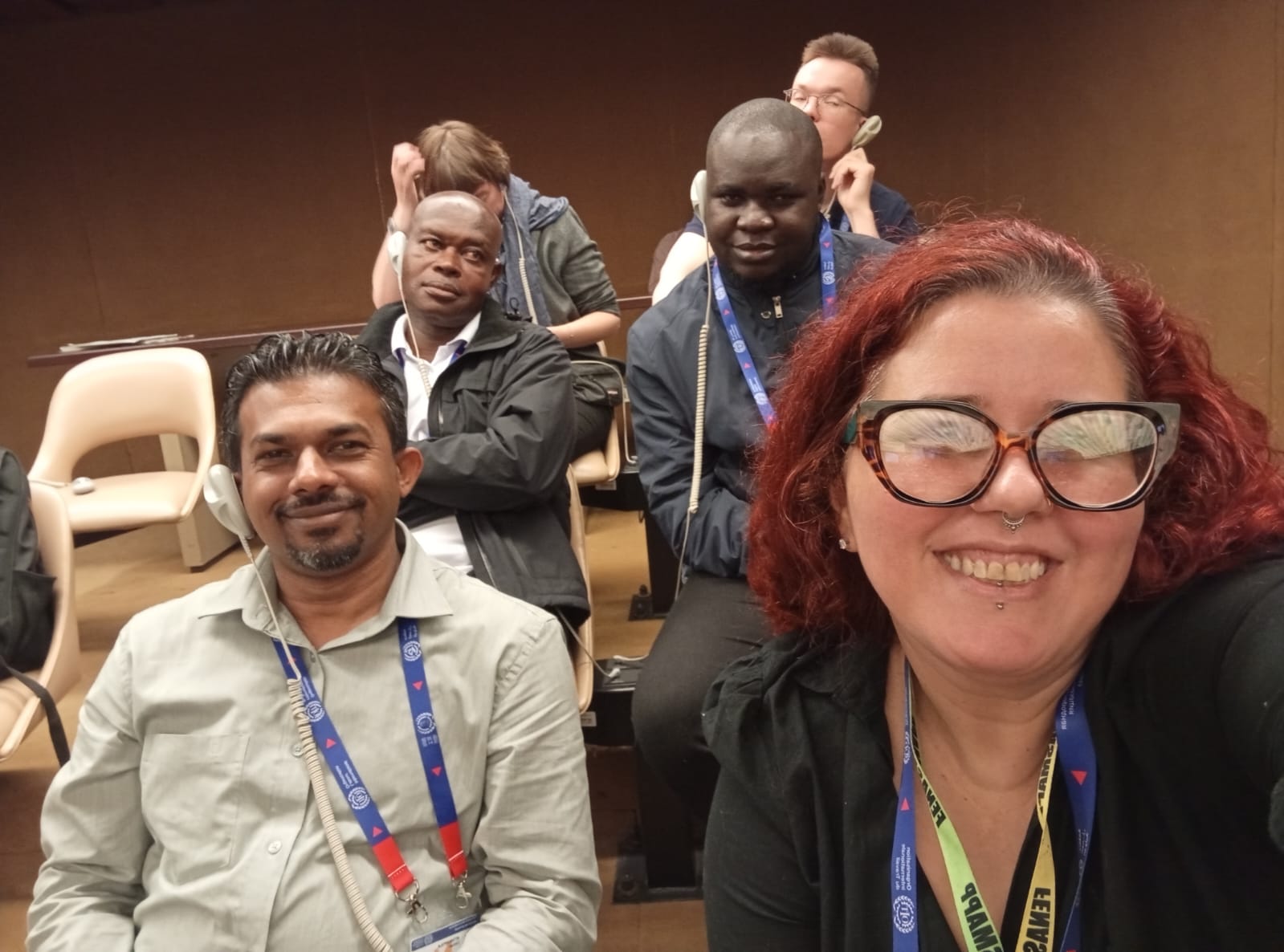
Worker delegates connected with their governments to win support and improvements in an international treaty on the rights of platform workers. Front from left: Charith Attanapola, Sri Lanka; Carina Trindade, Brazil. Rear from left: Philip Aryeh, Ghana; Mophat Okinyi, Kenya. Credit: Solidarity Center
To develop a Convention, workers, employers and government members meet in Geneva to debate and draft its content, and the June conference was the first of two such meetings. Together with digital app-based workers from seven countries, Brazil, Chile, Ghana, Kenya, India, Mexico and Sri Lanka, the Solidarity Center efforts were key to ensuring the proposed Convention and its Recommendations represented workers’ real-life experiences and concerns.
Months before the June ILC met to consider Convention proposals, Solidarity Center worked closely with the platform worker delegates, ensuring they were part of every step—contributing to the ILC’s multiple draft reports, advocating with lawmakers and engaging in training to hone their messages.
“By bringing together workers from multiple regions, the ILC served as a powerful space for South-South exchange,” said Kruskaya Hidalgo Cordero, Solidarity Center field organizing specialist. “Delegates strengthened trust, shared strategies and discussed common challenges such as ensuring labor standards cover digital platform workers.”
Building Worker Power, Democracy
With input into creating the latest draft, the involvement of the Solidarity Center conference delegates was key in discussions and in developing the most recent outline.
Closely coordinating with their unions at the conference, worker delegates provided feedback and recommendations to their government represetatives—who in turn often took supportive positions, raising key points during negotiations and in some cases, adjusting their votes.
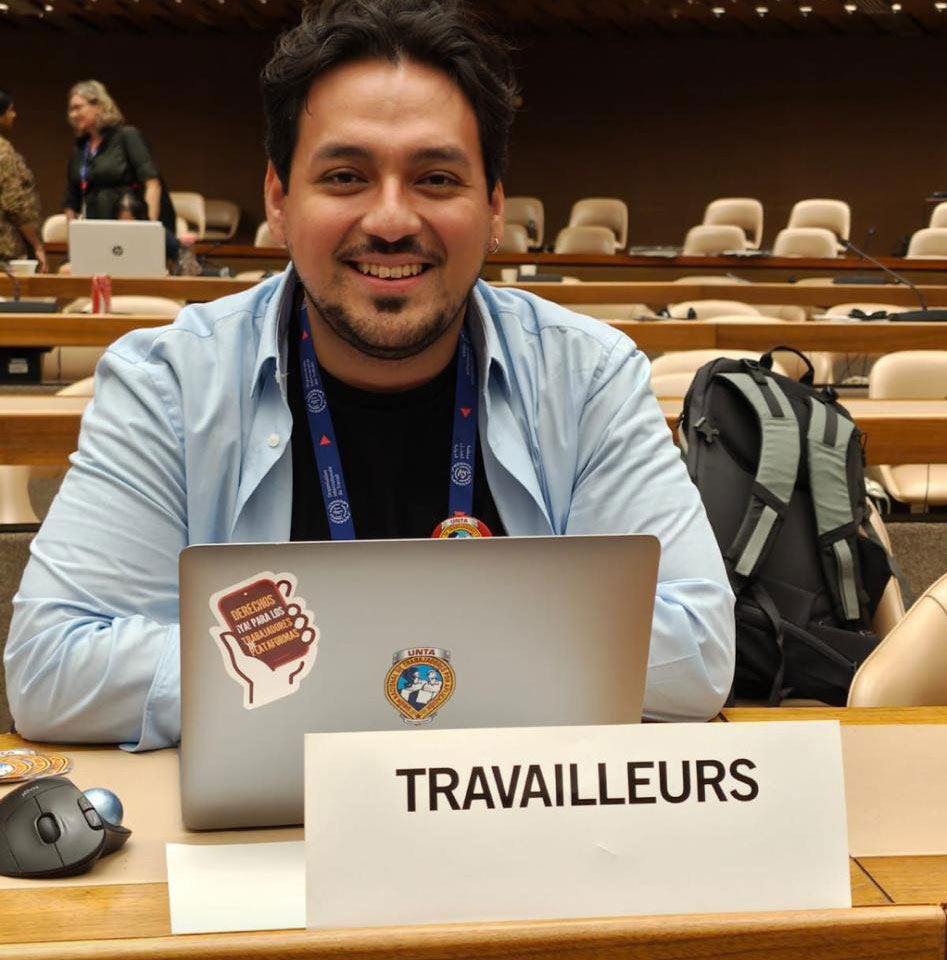
Sergio Guerrero from Mexico was among seven platform workers collaborating with the Solidarity Center to ensure decent work in the gig economy. Credit: Solidarity Center
The result, “Decent Work in the Platform Economy,” was a commitment to a Convention and Recommendation at the end of the process, as well as negotiated definitions and some initial language on the rights of workers to obtain information on automated systems. The platform workers will continue to hone and refine drafts throughout the year, with a final Convention and Recommendation likely adopted at the next ILC in June 2026.
Through ILC participation, the Solidarity Center enabled strong worker power—and worker democracy. Going forward, as part of the Organizing Department’s global platform and broader strategy on platform work, Solidarity Center will create a dedicated space for cross-regional collaboration. Digital app-based workers will take part in a series of virtual exchanges where they will share organizing strategies—strengthening bonds and coordination across regions.
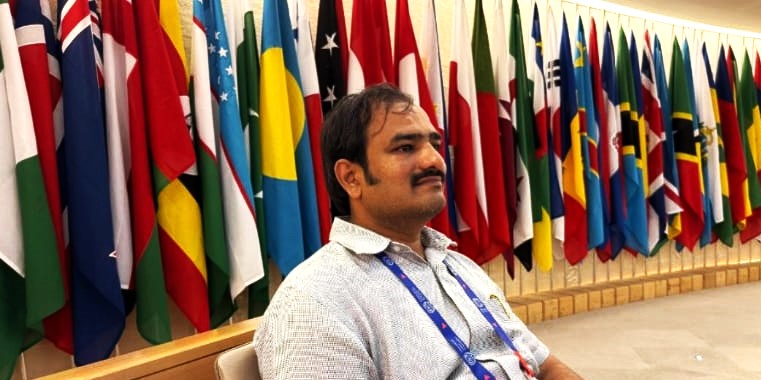
Digital app-based driver, Shaik Salauddin from India, part of the Solidarity Center delegation, frequently reaches out in social media through his union. Credit: Solidarity Center
Creating international connections at the ILC, where digital app-based workers initiated relationships with key global allies , expands connections not only for their organizing networks but also embeds platform worker issues more firmly within global union agendas.
“These interactions deepened the foundation for a worker-led international network capable of sustained collaboration beyond ILC spaces,” said Hidalgo Cordero.
Including Workers’ Voice
To ensure that workers are in the conversations around the informal economy, one Solidarity Center strategy included collaboration with Saida Ouaid, a member of the Democratic Confederation of Labor (CDT) in Morocco.
Ouaid represents agricultural workers, who are among the two billion people globally supporting themselves and their families in the informal economy—including street vendors, domestic workers and tuk-tuk drivers. These workers are not covered by “formal” economy protections, such as job safety and health or health care.
Ouaid actively participated in the ILC general discussion Addressing Informality and Promoting the Transition to Formality for Decent Work to reflect on progress made since the adoption of ILO Recommendation 204 and what else is needed to advance the transition to formality, in recognition that informality remains high.
“Being present gave me the opportunity to voice my organization’s position, which is the urgent need to improve the conditions of informal economy workers and to integrate them into a formal economy that meets the standards of decent work and dignified living,” she said.
The Solidarity Center also provided materials to union partners who sought to participate in the ILC discussions, including several from around Africa. And, the Solidarity Center coordinated positions and priorities with the International Domestic Workers Federation (IDWF), UNI Global and Women in Informal Employment Globalizing & Organizing (WIEGO), key to its efforts to build long-term alliances with global unions and other allies.
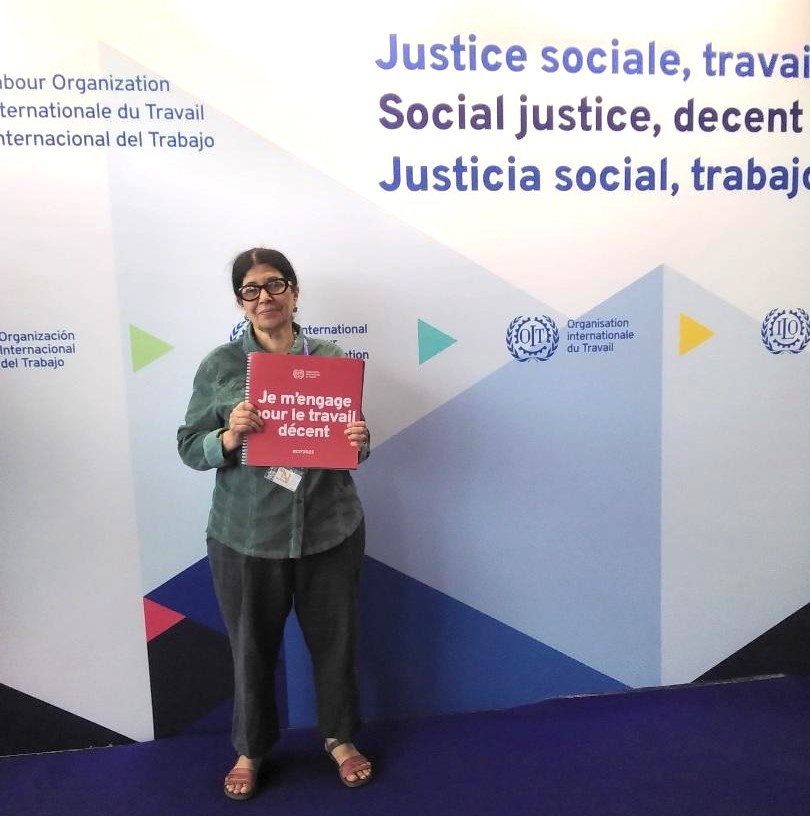
Solidarity Center delegate Saida Ouaid, a member of the Democratic Confederation of Labor in Morocco, pushed to improve conditions for 2 billion workers such as those in agriculture and street vending who are in the informal economy. Courtesy Saida Ouaid
Because working people and their union representative such as Ouaid were a key part of the discussions, they pushed back employer attempts to restrict union membership and collective bargaining to formal workers in accordance with national laws. Ultimately, the final document represents the success of working people in upholding the freedom to form unions and the right to collectively bargain as a right for “all workers” as essential for transitioning to inclusion in fundamental labor rights.
Including workers’ democratic freedom to form unions and bargain together recognizes the Solidarity Center’s core principle that unions are the democratic institutions of the working class that allow working people to stand together, speak up and bargain not only for better jobs, but for a better world.
“Attending this session was a rich and meaningful experience, through the contributions, testimonies and shared experiences of trade unions, during both the Workers’ Group meetings and the general sessions,” said Ouaid.
Workers’ Succeeded in Adding Key Rights
Working in agriculture, as a street vendor or in other jobs in the informal economy increases people’s vulnerability that typically cannot be addressed by a country’s basic labor protections. Workers at the conference were key to the adoption of new language on the necessity of employer and government accountability and creates an environment for transitioning to jobs in the formal economy that lead to worker protections.
Workers’ involvement also shaped the outcomes document so that it represents their lived experiences and the necessity for safe working conditions, by
- Acknowledging the importance of a safe and healthy working environment to decent work and
- Recognizing the role that trafficking, exploitation, stigmatization and harassment in hindering formalization efforts.
“There were a number of important provisions proposed by the workers’ group that were able to ensure the rights of informal economy workers in the final outcomes,” said Erin Radford, senior specialist in Solidarity Center’s Global Worker Empowerment Department.
“In other cases, the workers’ group was successful in eliminating harmful amendments proposed by the employers’ group or governments or in reducing the harm of the amendments. In particular, it was important to ensure nothing in these outcomes would undermine or weaken the 2015 document.”
See all the texts adopted in the June 2025 conference: Texts adopted by the International Labor Conference at its 113th Session.

